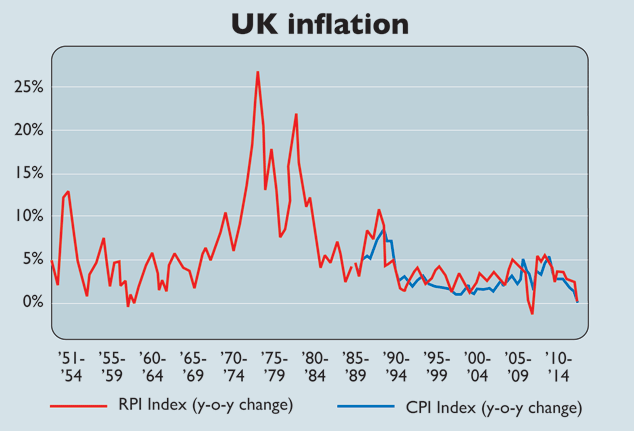
The UK economy is on the cusp of deflation. The annual rate of consumer price inflation (CPI) fell to 0% in February, from 0.3% the previous month. In other words, prices have not risen in the past year. This marks the lowest inflation since this CPI series began in the late 1980s. And projecting the data further back suggests it is the weakest since 1960, according to the Office for National Statistics.
The Retail Price Index (RPI), which includes housing costs, is still above zero and last dipped into deflation in 2009 (see chart above). Lower food and petrol prices were behind the decline: they have fallen by 3.4% and 17% respectively over the past 12 months. Core inflation (which strips out food and energy prices) also weakened, from 1.4% to 1.2%.
What the commentators said
Deflation is almost certainly coming our way. Price cuts by utility companies, and recent declines in oil and food prices, have yet to be fully reflected in the data. Michael Saunders of Citigroup points out that deflation is already here if you exclude the impact of changes in taxes, with prices down 0.1% year-on-year.
Some economists worry that deflation could become entrenched, leading to a Japan-style slump with sliding prices, wages and demand. “We should expect policymakers to take drastic action to prevent deflation taking root,” said Fexco’s David Lamb. “This is a code red moment.”
But there’s “no need… for a kneejerk reaction”, said Andrew Clark in The Times. Wages are set to pick up, people’s expectations of inflation look healthy and there’s no evidence of stagnation. This suggests core inflation is unlikely to melt away.
The classic worry when it comes to deflation is that people put off major purchases because they expect things to get cheaper, undermining demand, said Fraser Nelson on spectator.co.uk. But so far there is “zero evidence of this happening”.
Indeed, as Citigroup points out, “the opposite is the case”. Lower prices are encouraging spending. In February the share of people who thought it was a good time to make a major purchase rose to an eight-year high. The proportion of those who thought the next year could be good to do so is at a 12-year high.
What we have here is a “good form of deflation in which lower global food and energy prices provide a much needed boost to household real income levels”, said PricewaterhouseCoopers’ John Hawksworth. So “let’s exhale, rather than panic”, concluded Clark, “and enjoy a rare interlude of value in our shopping trolleys”.